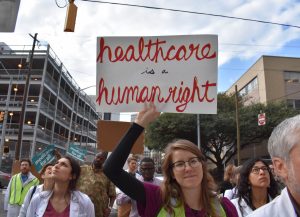This article was published in The Lens. You can read the original article here.
“Our healthcare system is rotten to the core, and half-measures and meager reforms won’t cut it.”
 In late February, Seattle-area U.S. Rep. Pramila Jayapal, introduced a “Medicare for All” bill in Congress that immediately attracted more than 100 Democratic co-sponsors. The legislation, if passed, would provide comprehensive healthcare coverage — medical, dental, prescriptions, long-term care, mental health, and more — to every resident in the United States, with no copays, premiums, or deductibles.
In late February, Seattle-area U.S. Rep. Pramila Jayapal, introduced a “Medicare for All” bill in Congress that immediately attracted more than 100 Democratic co-sponsors. The legislation, if passed, would provide comprehensive healthcare coverage — medical, dental, prescriptions, long-term care, mental health, and more — to every resident in the United States, with no copays, premiums, or deductibles.
Medicare for All is a wildly popular policy. Recent polls show that 70 percent of Americans support Medicare for All, including 85 percent of Democrats and 52 percent of Republicans.
Why, then, has our Representative Cedric Richmond not co-sponsored his fellow Democrat’s bill, one that saves working families money and guarantees healthcare security to every single person in America?
Perhaps he fears that Medicare for All is too pie-in-the-sky. Comprehensive, universal coverage? How could we afford something so extravagant? One estimate from Senator Bernie Sanders’ office calculated that through a combination of progressive income taxes, capital gains and dividends taxes, and limits on tax deductions for the wealthy, we could raise $1.8 trillion over 10 years without needing to raise taxes on the middle and working class.
There are also significant savings associated with transitioning to a Medicare for All program, due to decreased administrative costs and the federal government’s ability to negotiate drug prices. Consequently, even a study from a libertarian think tank, the Mercatus Center, showed that Medicare for All would ultimately save trillions of dollars. Meanwhile, the average family of four with employer-sponsored insurance spent $28,166 on health insurance in 2018. Medicare for All would likely save the average working person thousands of dollars per year by eliminating co-pays, deductibles, and premiums.
Or perhaps Richmond doesn’t want to rock the boat? Isn’t the American healthcare system the envy of the world? But the reality is that we are already spending more money than any other industrialized nation — about double what other rich countries spend per capita — and still achieving worse outcomes.
The U.S. spends a fifth of our GDP on healthcare costs, yet our maternal mortality rate continues to rise, even as the global maternal mortality rate falls. Over the last few years, the rate of congenital syphilis — a completely preventable and debilitating illness — has more than doubled. In Louisiana, Black women are four times more likely to die in childbirth than white women.
Although universal healthcare coverage is not a panacea, it would at least ensure that there are no gaps in coverage during a person’s lifetime, greatly increasing the likelihood that new mothers would receive timely prenatal care.
Perhaps Richmond’s worried about longer wait times, or perhaps he fears that transitioning to Medicare for All will lead to rationing of care. But the reality is that we are already rationing care: patients with money or excellent insurance can get seen quickly, while the rest of us have to wait.
Perhaps Richmond thinks we simply don’t need Medicare for All. After all, thanks to the expansion of Medicaid, hundreds of thousands of Louisianans gained coverage. But currently, 11.4 percent of Louisianans live without health insurance. And for those with insurance, instead of comprehensive care that’s free at the point of service, as Medicare for All would be, insurance companies deliver high premiums, deductibles, copays and denials of service.
Health justice activists have been fighting for universal coverage for decades. Now, in part due to a powerful national coalition formed between National Nurses United, the Democratic Socialists of America, and several other organizations, we are closer than ever before to making this a reality.
Our local New Orleans chapter of the DSA — an organization that has almost 60,000 dues-paying members nationally and hundreds locally — has been building a campaign to demand Medicare for All. We’ve been canvassing our neighborhoods, tabling at public events, organizing community health fairs, and pressuring our politicians. Most importantly, we’ve been listening to the community’s healthcare horror stories. We, the people of New Orleans, are in dire need of better healthcare, and Medicare for All is the only policy tool that can make that happen.
We’ve talked to people who waited weeks to see a specialist because there are so few physicians who accept Medicaid insurance. We’ve spoken with neighbors who paid thousands of dollars in medical bills even though they had insurance. We’ve met people who are afraid to go to the doctor at all — they’re afraid of what they might find and what it might cost. The Medicare for All legislation put forward by Jayapal is sorely needed to correct the inadequacies and failures of our nation’s healthcare system.
Other politicians have also proposed solutions, but they all fall short. Presidential candidate Beto O’Rourke, a former congressman, has spoken in support of the Medicare for America Act, but this program wouldn’t provide universal coverage, and it doesn’t eliminate co-pays, premiums, or deductibles. (Note how the name similarity of “Medicare for All” and “Medicare for America” allows politicians to capitalize on Medicare for All’s popularity by using the #M4A hashtag.)
By retaining private insurance alongside public insurance, Medicare for America would simply perpetuate the tiered, hierarchical system we have now. A crucial aspect of the Medicare for All plan is that it brings everyone together under the same health plan, thus moving us towards a future where everyone has access to the same, high-quality care.
Other approaches, such as the “public option,” which allows individuals to buy into the Medicaid or Medicare programs, have been shown to be deeply ineffective. In 2013, the Congressional Budget Office (CBO) reported that this approach would have “minimal impacts” on the number of uninsured Americans.
Our healthcare system is rotten to the core, and half-measures and meager reforms won’t cut it. We need to pursue radical transformation and effect real change. Right now, we have the political opportunity to do so.
Consistently, when we are talking to our fellow constituents in Richmond’s district, we hear the same refrain: of course we want this, of course we need this, how is it possible that our congressman doesn’t support this?
Soon, for the first time in U.S. history, legislation on the implementation of a single-payer healthcare system will be heard before congressional committees. These hearings will be great opportunities to show Louisianans how transformative a Medicare for All program would be.
Richmond has voiced tentative support for the bill, but we need him to turn that talk into action: we need him to co-sponsor this legislation. As the former head of the Congressional Black Caucus, Richmond is a leader on Capitol Hill. We need his leadership on healthcare. Otherwise, his constituents will continue to endure substandard care, to be driven into medical bankruptcy, and to die of preventable illnesses.
If Richmond truly believes that all Louisianans, no matter their income or their age or their medical history, deserve comprehensive healthcare, he will co-sponsor the Medicare for All Act and champion it in the halls of Congress. If he chooses not to do that, we hope he’ll tell us: which of his constituents does he believe should go without healthcare?
 Frances Gill is a medical student and co-chair of the Health Care Committee in the New Orleans chapter of the Democratic Socialists of America. The DSA is a national organization with chapters in New Orleans and Baton Rouge. Email healthcare@dsaneworleans.org for more information.
Frances Gill is a medical student and co-chair of the Health Care Committee in the New Orleans chapter of the Democratic Socialists of America. The DSA is a national organization with chapters in New Orleans and Baton Rouge. Email healthcare@dsaneworleans.org for more information.